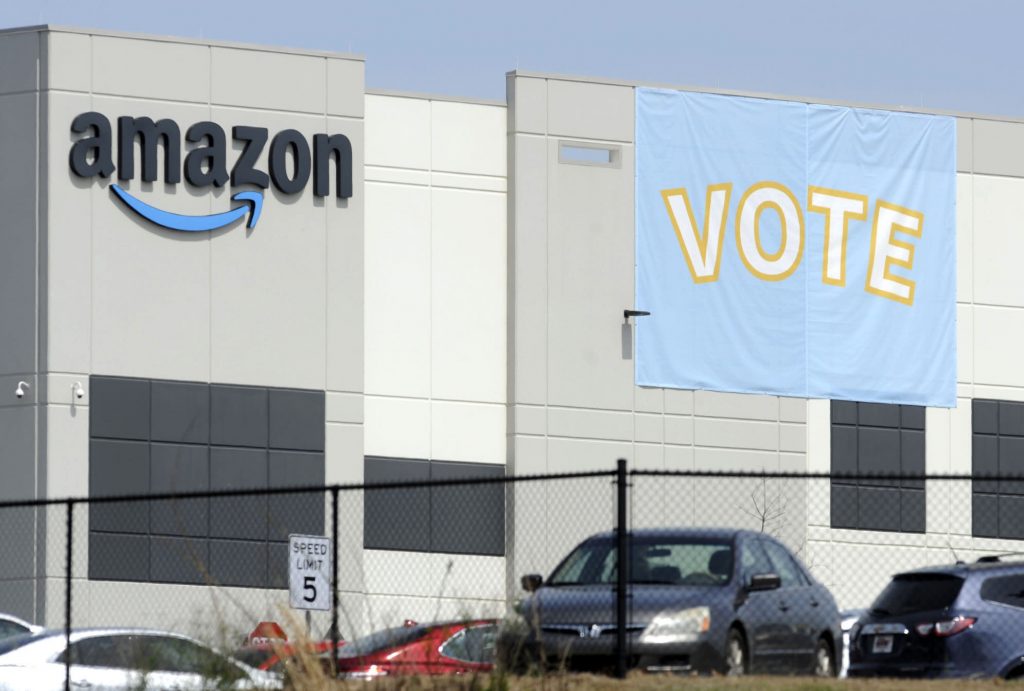For those of us watching closely, it’s like the 2020 election 2.0 — but this time without having to memorize every county of Pennsylvania.
While we don’t know when the results will be announced, we can explain why it’s taking so long and assess some of the possible scenarios.
5,800 ballots were sent out starting February 8 for the mail-in vote. Both full-time and part-time workers at the Amazon Fulfillment Center in Bessemer, Alabama were eligible to vote and the last votes were received on March 29.
Come to a panel with a Bessemer Amazon worker and Robin D.G. Kelly, author of Hammer and Hoe to discuss the results of the unionization vote. Sign up here. Find the Facebook event here.
Throughout the election period, Amazon led a vast and expensive anti-union campaign. Every day, workers were subject to countless anti-union meetings, text messages, and even threats. There were even anti-union signs in the bathrooms, yet there were no mechanisms for the union to get unhindered access to workers.
Counting the Votes
After two months of voting, the ballots were sent to the National Labor Relations Board to be counted in front of observers from Amazon and the Retail, Wholesale and Department Store Union. In the first step, the NLRB checks the names of everyone who voted against the official employee roll. Both sides are able to contest ballots and those challenged will be set aside.
Some of the reasons to contest ballots include that a person doesn’t work at the warehouse anymore or should not be included in the bargaining unit because of job classification or managerial responsibilities. Reuters reported that 19 people received ballots even though they no longer worked at Amazon.
Then the ballots will be counted: for and against the union. They are counted twice in batches of 100. Slate reports that if thousands of people voted, this process could take weeks. A simple majority of votes is needed to win the union. The NLRB has not released the number of ballots submitted, nor how many have been contested so far.
If the number of contested votes is high enough to change the final outcome, hearings may be held to have those votes counted. This would further delay results. Both sides would then argue their case for each ballot.
Is It Over When It’s Over?
Even after the final results come out, the struggle for a union won’t be over. If the union wins, it’s likely that Amazon will file objections to the vote and a legal battle will ensue.
If the “no” votes prevail, the RWDSU will rightfully contest the election. Amazon, after all, used illegal measures to stop the unionization effort. In this case, the NLRB would schedule a hearing to decide if the results should be disregarded because the company “created an atmosphere of confusion or fear of reprisals” for workers. If that happens, the NLRB could demand that a new union recognition vote take place.
In this interim — and we have no idea how long it will last — Amazon workers should begin to organize protests and actions. The RWDSU should be on the front lines of this. If they lose the election, workers can and should force a new vote. If the workers do win union recognition, next comes the contract struggle and another brutal battle. So Amazon workers should begin to fight and organize now.
It Shouldn’t Be This Hard to Form a Union
It shouldn’t be this arduous to form a union. The way the process works now, there are essentially two elections. Workers need to ratify a union twice: the first time signing up co-workers for a union petition, and then, weeks later, getting workers to certify the union. The extensive time between “going public” and actually ratifying the union gives bosses tons of time to interfere with the vote and hire law firms that specialize in union-busting. And the bosses rarely even try to be sneaky or secretive about their union-busting tactics. It’s all out in the open because the penalties are meager. For the bosses, illegal anti-union activities are just good business.
The PRO Act is a start in the struggle against repressive anti-union measures. The proposed law would ban the anti-union captive-audience meetings Amazon used to bully and harass workers, and would also dramatically shorten the time between a unionization petition and the vote. The PRO Act would be a step forward. But as is true throughout history, reforms are not handed to the working class, they must be won through active struggle — mass protests and even strikes. Unions and the working class as a whole will need to actively participate in the struggle to win these reforms, not passively hope that Biden will pass them.
It should be easy to form a union. Every worker should have the democratic right to be part of one. The Amazon example and the long wait for the results only highlight the difficulties of unionizing in the United States today.











